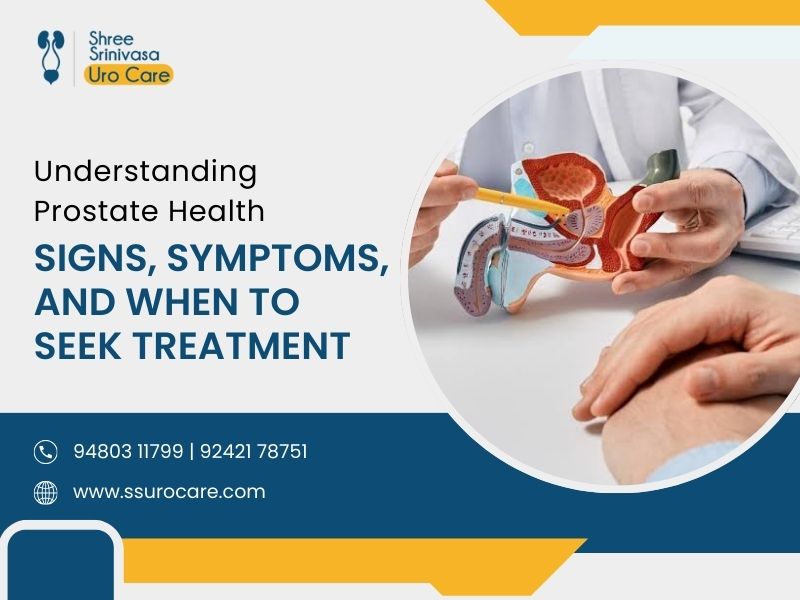The prostate is a small but essential gland in the male reproductive system, which produces seminal fluid that nourishes and transports sperm. While it plays a vital role in men's health, many men remain unaware of prostate-related issues until they experience symptoms. As men age, the risk of prostate problems increases, making it vital to understand the early warning signs and seek timely medical care.
This article explores common prostate health concerns, symptoms, and when to consult a doctor for evaluation and treatment.
What is the Prostate and Its Function?
The prostate is a walnut-sized gland below the bladder and in front of the rectum. It surrounds the urethra, the tube that brings urine and semen out of the body. The main role of the prostate is to produce seminal fluid, which helps transport and protect sperm during ejaculation.
As men age, the prostate naturally enlarges, which can sometimes lead to health complications. Understanding these modifications and their potential impact is key to maintaining overall well-being.
Common Prostate Health Issues
Several prostate conditions can affect men, particularly as they age. The most common ones include:
- Benign Prostatic Hyperplasia (BPH) – A non-cancerous growth of the prostate, leading to difficulty in urination. This is a common condition in men over 50.
- Prostatitis – Inflammation of the prostate, often caused by bacterial infections. It can result in pain, discomfort, and urinary issues.
- Prostate Cancer – One of the most common cancers in men. Early detection can significantly improve treatment outcomes.
Each of these conditions presents different symptoms, but they often share similar urinary and reproductive concerns.
Signs and Symptoms to Watch For
Being aware of prostate health symptoms can help in early detection and treatment. Some common signs include:
- ✅ Difficulty urinating or a weak urine stream
- ✅ Recurring urination, particularly at night
- ✅ Pain or burning sensation while urinating
- ✅ Blood in urine or semen
- ✅ Ache in the lower back, hips, or pelvic area
- ✅ Erectile dysfunction or painful ejaculation
- ✅ Unexplained weight loss or fatigue (in advanced cases of prostate cancer)
If you experience any of these symptoms, it is important not to ignore them. While some may be harmless, they can also indicate underlying conditions that require medical attention.
When Should You Seek Medical Help?
Many men assume that urinary changes are a normal part of aging, but persistent or severe symptoms should not be ignored. Here’s when you should see a doctor:
- 🔹 If you have a problem starting or stopping urination
- 🔹 If you see blood in your urine or semen
- 🔹 If you experience chronic pelvic pain or discomfort
- 🔹 If you feel a frequent urge to urinate but pass only small amounts
- 🔹 If symptoms hinder daily activities or quality of life
Men over the age of 50 should also consider regular prostate screenings, especially if they have a family history of prostate cancer. A simple PSA (Prostate-Specific Antigen) test can help detect potential problems early.
Treatment Options
Treatment options depend on the condition:
- For BPH: Medications, lifestyle changes, or minimally invasive procedures can help.
- For Prostatitis: Antibiotics and anti-inflammatory medications are often prescribed.
- For Prostate Cancer: Treatment ranges from active monitoring to surgery, radiation, or hormone therapy, depending on severity.
Preventive Measures for Prostate Health
While some risk factors like age and genetics cannot be altered, adopting a healthy lifestyle can help reduce the likelihood of prostate issues:
- 🥗 Eat a balanced diet – Have foods rich in antioxidants, such as tomatoes, green vegetables, and nuts.
- 🏃 Exercise regularly – Physical exercise helps keep a healthy weight and improves prostate function.
- 💧 Stay hydrated – Drinking plenty of water supports urinary and prostate health.
- 🚬 Avoid smoking and excessive alcohol – Both can contribute to prostate problems.
- 🗓 Get regular check-ups – Early detection is key to preventing serious complications.
Conclusion
Prostate health is an essential part of overall well-being that men should not overlook. While prostate issues are common, they are also manageable with early detection and proper treatment. Paying attention to symptoms, seeking medical advice when necessary, and maintaining a healthy lifestyle can go a long way in preventing complications.
If you or someone you know is experiencing signs of prostate trouble, don’t hesitate to book a consultation at Shree Srinivasa Urocare. We also provide prostate laser surgery in Bangalore.
Being proactive about prostate health can help ensure a better quality of life and long-term wellness.

